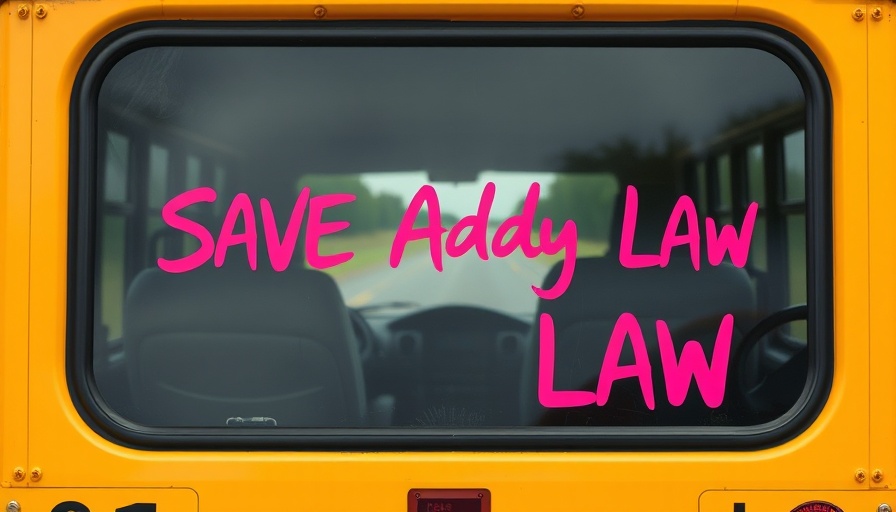
Understanding the Impact of House Bill 344
This Wednesday, March 5, a significant committee hearing will take place regarding House Bill 344, a proposed piece of legislation that seeks to amend existing penalties for drivers who pass stopped school buses in Georgia. Specifically, this bill aims to lower fines from a steep $1,000 to more manageable amounts: $300 for first-time offenders and $500 for second offenses, while maintaining the $1,000 fine for third and subsequent infractions. As lawmakers approach this sensitive issue, stark community reactions reveal a deep divide regarding the value of child safety versus financial burdens on families.
A Review of 'Addy’s Law'
Last year, the Georgia General Assembly passed “Addy’s Law,” a measure championed in response to the tragic death of eight-year-old Adalynn Pierce, who was killed while crossing the street to board her school bus. This legislation established the current $1,000 fine for violations, aimed squarely at deterring potentially fatal negligence among motorists. Despite its justifiable origins, new discussions catalyzed by House Bill 344 are raising questions about the law’s financial implications for Georgian families.
Community Sentiment: Divided Reactions
Following the introduction of House Bill 344, public sentiment has been notably polarized. Rep. Dan Parsons, the bill’s sponsor, argues that the $1,000 fine establishes an undue financial burden, establishing a real fear of hardship among families that may inadvertently violate traffic laws. This perspective has, however, not been well-received by a significant portion of the community. Many commenters on social media and local news articles express the belief that more stringent fines are essential for preserving child safety, suggesting that looser penalties could lead to a higher risk of dangerous driving behavior around school zones.
The Legislative Process: What’s Next?
The path to enacting House Bill 344 has seen some turbulence. Initially, a proposal to adjust fines to $500 for all offenses was tabled and subsequently withdrawn before the House Committee on Motor Vehicles could act, resulting in the bill being directed to the House Judiciary Non-Civil Committee. Here, lawmakers will have the flexibility to review the proposed bill and make amendments based on previous feedback, illustrating the intricate dance between legislative efficacy and public safety priorities.
Contrasting Perspectives: Financial Burden vs. Safety Standards
As this legislative debate unfolds, it’s vital to appreciate the complexity behind it. Supporters of the bill highlight the notion of reasonable consequences for law violations, especially in the economic climate faced by many Georgians today. They contend that flexibility in sentencing is essential, allowing judges to consider the circumstances surrounding each violation. This perspective, however, runs counter to the majority opinion expressed by those advocating for greater enforcement of traffic laws around school buses. The supporters of Addy’s Law argue that the severity of consequences must reflect the critical nature of the law's intent, emphasizing that running a school bus stop sign is tantamount to child endangerment.
Looking Ahead: What This Means for Georgia’s Children
The potential implications of House Bill 344 extend beyond mere fines; they delve into the broader theme of community safety as children navigate their way to and from school. Many community leaders and child safety advocates are urging lawmakers to reconsider the proposals linked to this bill, reinforcing the idea that while fiscal concerns are valid, they should never overshadow the ultimate priority: protecting the lives of children. The historic context surrounding such laws must be preserved, as they exist to prevent avoidable tragedies.
Call to Action: Get Involved and Make Your Voice Heard
With the committee hearing scheduled for this Wednesday, it is essential for concerned citizens to stay informed and participate in the discussions around House Bill 344. Engaging with local representatives, attending the hearing, or voicing opinions through social media platforms can help to shape the outcome of this crucial legislation. Your voice matters—in ensuring the safety of children while balancing the considerations of everyday life for Georgian families.
 Add Row
Add Row  Add
Add 



 Add Row
Add Row  Add
Add 
Write A Comment